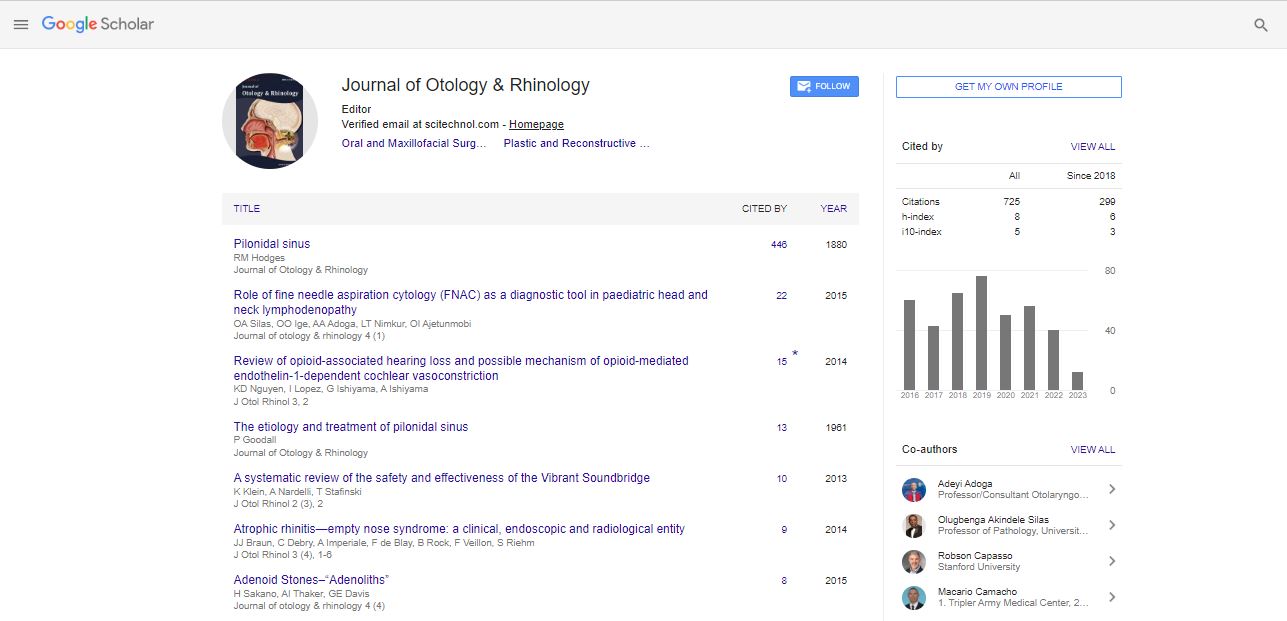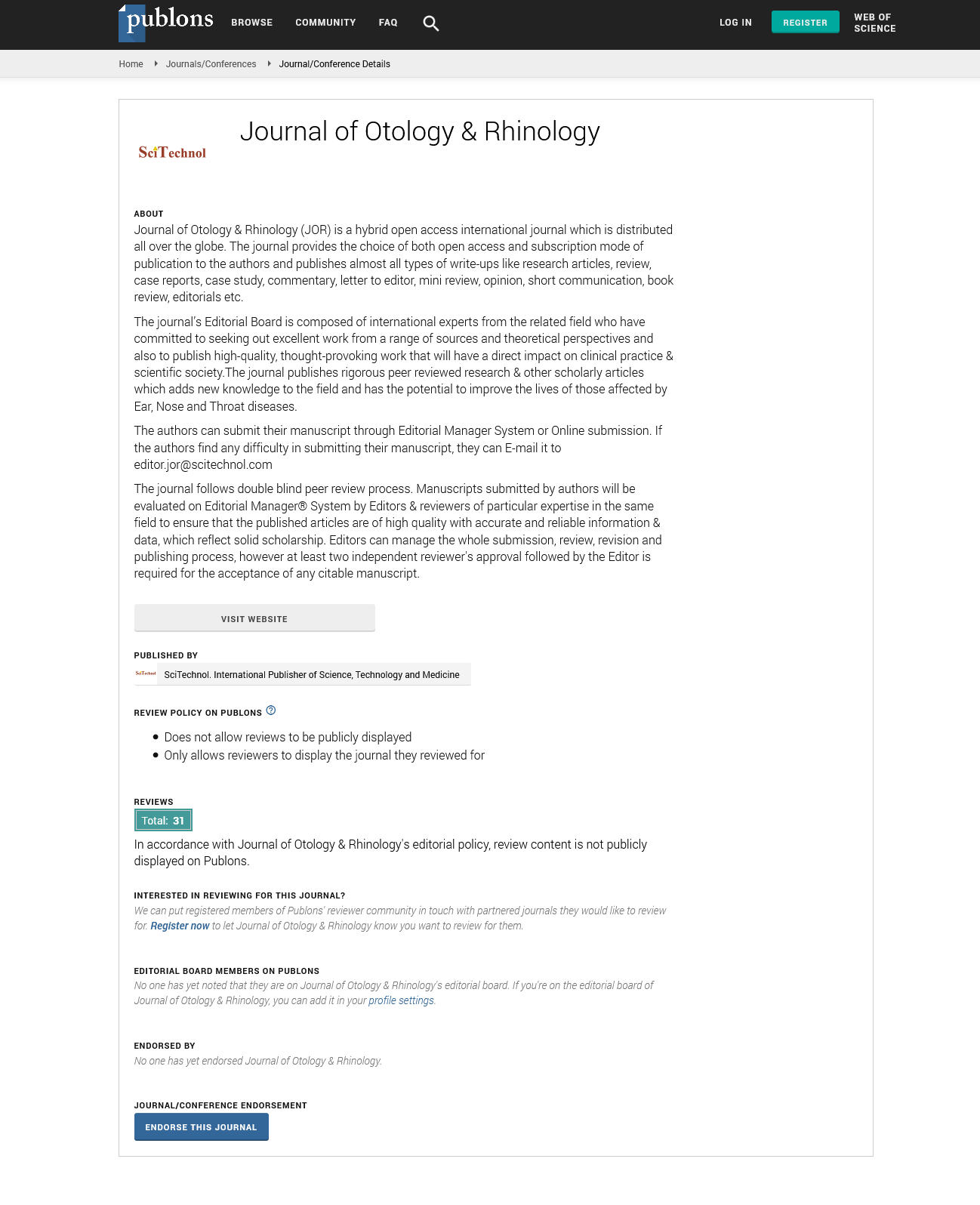Perspective, J Otol Rhinol Vol: 12 Issue: 1
Exploring the Link between Hearing Loss and Balance Disorders
Henrique Felix*
Department of Otorhinolaryngology, Campinas State University, Rio de Janeiro, Brazil
*Corresponding Author: Henrique Felix
Department of Otorhinolaryngology, University, Campinas State Rio de Janeiro, Brazil
E-mail: felixhenrique@gmail.com
Received date: 02 January, 2023, Manuscript No. JOR-23-89433;
Editor assigned date: 04 January, 2023, PreQC No. JOR-23-89433 (PQ);
Reviewed date: 18 January, 2023, QC No. JOR-23-89433;
Revised date: 25 January, 2023, Manuscript No. JOR-23-89433 (R);
Published date: 01 February, 2023, DOI: 10.4172/2324-8785.100036
Citation: Felix H (2023) Exploring the Link between Hearing Loss and Balance Disorders. J Otol Rhinol. 12:1
Description
Hearing loss is a common condition that affects millions of people worldwide. It can be caused by a various of factors, including genetics, age, and exposure to loud noise, certain medications, infections, and trauma to the ear. The condition can range from mild to severe and can impact a person's ability to communicate, socialize, and function in daily life. Mild hearing loss may cause difficulty hearing soft sounds, while severe hearing loss can result in complete deafness. Symptoms of hearing loss can also include ringing in the ears, dizziness, and difficulty understanding speech.
There are several treatment options for hearing loss, including hearing aids, cochlear implants, and assistive listening devices. In some cases, medical or surgical interventions may be necessary. Prevention of hearing loss is also essential. This can include avoiding exposure to loud noise, wearing protective earplugs or earmuffs, and maintaining good ear hygiene.
Hearing loss can be caused by a variety of factors such as aging, noise exposure, infections, ototoxic medications, and genetic predisposition. While some factors may be beyond our control, there are several steps we can take to prevent hearing loss
• Protect ears from loud noise exposure to loud noise can cause permanent hearing damage. Use earplugs or earmuffs when you are exposed to loud noises, such as concerts, sporting events, and fireworks displays.
• Limit the use of headphones or earbuds listening to music or other audio through headphones or earbuds can damage hearing if the volume is too high. Keep the volume at a moderate level and take breaks to give ears a rest.
• Keep ears clean buildup of earwax can lead to hearing loss. Use a soft cloth to clean the outer ear and avoid using cotton swabs or other objects that can push the wax further into the ear canal.
• Get regular hearing checks regular hearing checks can help identify any hearing loss early, allowing for prompt treatment or management.
• Avoid ototoxic medications certain medications can damage the inner ear and cause hearing loss. If taking medications that are known to be ototoxic, discuss with the doctor about alternative medications or management strategies.
• Maintain a healthy lifestyle smoking, excessive alcohol consumption, and poor nutrition can all contribute to hearing loss. Maintaining a healthy lifestyle can help reduce the risk of hearing loss.
By taking these steps, you can reduce your risk of developing hearing loss and protect your hearing for years to come.
Balance Disorders
These are a group of conditions that can affect a person's ability to maintain stability and remain upright. These conditions can be caused by various factors, including inner ear problems, neurological conditions, medications, and certain medical conditions such as diabetes. Symptoms of balance disorders can include dizziness, vertigo, lightheadedness, unsteadiness, and falls. These symptoms can impact a person's ability to perform daily activities, work, and engage in social interactions. Treatment for balance disorders can include medications, vestibular rehabilitation therapy, and surgical interventions. It is also essential to address any underlying medical conditions that may be contributing to the balance disorder.
Prevention of balance disorders can include staying active and exercising regularly, avoiding substances that can impair balance, such as alcohol and certain medications, and maintaining a healthy diet and lifestyle. It is important to seek medical attention if experiencing symptoms of hearing loss, as early intervention can help prevent further damage and improve your quality of life.
Conclusion
The relationship between hearing loss and balance disorders is complex and multifactorial. If they experiencing symptoms of either hearing loss or balance disorders, it's important to see a healthcare provider who can perform a thorough evaluation and recommend appropriate treatment options.
 Spanish
Spanish  Chinese
Chinese  Russian
Russian  German
German  French
French  Japanese
Japanese  Portuguese
Portuguese  Hindi
Hindi 


